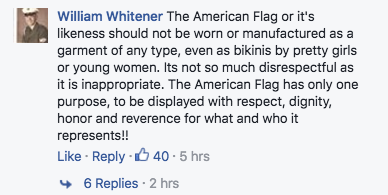This Meme Might Make You Think Twice About Your Fourth of July Bikini

By:
Is it "disrespectful or awesome" to wear an American flag on your bathing suit this Independence Day? It's a question that's stumped legal scholars for decades and a group of Donald Trump supporters.
 Facebook/Trump Wall - facebook.com
Facebook/Trump Wall - facebook.com
While the Trump-centric Facebook page "Trump Wall" typically concerns itself with spreading anti-immigrant rhetoric and ridiculing Trump's political opponents, it took some time recently to foster a debate about the appropriate uses of Old Glory.
The conversation started on a Tuesday.
The administrator of the Trump Wall page posted the American flag meme and asked its followers: "what say you?" More than 500 people answered.
Most Facebook users' comments were appreciative of the American flag bathing suits, even calling them "patriotic."
 Facebook/Trump Wall - facebook.com
Facebook/Trump Wall - facebook.com
 https://www.facebook.com/donald.trump.wall/photos/pb.1480717605584637.-2207520000.1467141095./1656429481346781/?type=3&theater
https://www.facebook.com/donald.trump.wall/photos/pb.1480717605584637.-2207520000.1467141095./1656429481346781/?type=3&theater
Some people appreciated them too much.
 Facebook/Trump Wall - facebook.com
Facebook/Trump Wall - facebook.com
However, other Facebook users brought up an important point.
There are actually federal guidelines regulating appropriate uses of the American flag. To some, American flag bikinis violate those guidelines.
 Facebook/ Trump Wall - facebook.com
Facebook/ Trump Wall - facebook.com
U.S. Flag Code expert Mike Buss from the American Legion told ATTN: that most people don't know about the code.
"A lot of folks just don't realize the flag code exists, but once they realize it, there's usually an effort to find out more about it and use it," he said.
The National Flag Conference in Washington, D.C., in 1923 created the basis for a flag code with rules for handling and flying the American flag. The federal government made the U.S. Flag Code a law in 1942, during World War II.
The code has some strong statements against wearing the American flag on clothing. But there's some debate as to whether a flag-themed bikini actually constitutes an official American flag.
"There are people who take the interpretation, for lack of a better word, stricter," he said. However, Buss said that many of the things people commonly call a flag are actually not American flags at all and therefore don't violate anything.
"There are people who send me pictures of an American flag cake and I say, 'Well are you actually going to take the cake and run it up the flag pole?'" he said. "No, that's not a flag."
Here are two quotes from the U.S. Flag Code about American flag clothing:
1. "The flag should never be used as wearing apparel, bedding, or drapery."
 Google Image Search - google.com
Google Image Search - google.com
 Google Image Search - google.com
Google Image Search - google.com
Buss said that American flag bikinis, like the ones in the meme, or bedding with flag print do not violate flag code because, well, that's not the American flag. "Bikini-clad young ladies look like they might be wearing part of something that looks like the flag, but that's not the flag," he said. "It's pieces of something that resembles the flag, but it's not." The American flag is something that cannot exist in separate pieces of print, according to Buss.
2. "No part of the flag should ever be used as a costume or athletic uniform."
 Google Image Search - google.com
Google Image Search - google.com
Buss said that the same thing goes for athletic wear such as T-shirts, shorts, or even ties. If a pattern only resembles a flag, it's not the American flag. "You might have a tie and it might be a red, white and blue stars motif, and in that case press on," he said. "It's the same thing with a pair of shorts."
Also, if a T-shirt does have a realistic American flag print on it, the shirt most likely isn't violating flag code. "People wearing T-shirts with prints are fine," he said. "They're trying to be patriotic."
 Google Image Search - google.com
Google Image Search - google.com
The bottom line is that an American flag is generally something that can be hoisted up a flag pole, so if your clothes aren't made to do that, you're probably not violating the flag code, according to Buss.
Still, even if someone considers your apparel to be in violation of U.S. Flag Code, nothing can really come of it. The U.S. Flag Code is only a strongly worded guideline for civilians. There are no legal consequences for breaking the code if you're not in the military or serving in a government position.
"Thus, the Flag Code does not prescribe any penalties for non-compliance nor does it include enforcement provisions; rather the Code functions simply as a guide to be voluntarily followed by civilians and civilian groups."- U.S. Flag Code
Although there are no legal consequences for breaking flag code, organizations such as the American Legion and members of the Citizens Flag Alliance want a constitutional amendment to stop "physical desecration" like flag burning.
People on Twitter had mixed feelings about reports of flag burning at a trans march in San Francisco.
The Supreme Court ruled in 1989 and 1990 that burning or desecrating the flag is a form of political free speech. There have been several state and federal amendment proposals since then to ban desecration of the flag. One of the most notable attempts was a 2006 Senate amendment to the constitution that came just shy of passing through to the final phase. The Senate needed a two-thirds majority to submit the amendment to the states for ratification, according to The Washington Post.
